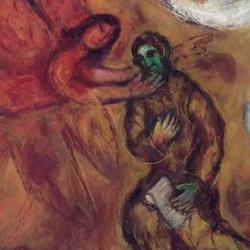The last five words of Isaiah 24:16 are all from the same root, bagad , which means “to deal treacherously.” The Hebrew sounds something like this: bogdim bagadu ubeged bogdim bagadu , and might be translated like this: “traitors do treachery and treachery traitors do treachery.” (The noun form, beged , usually means garment, and if I were not worried about James Barr, I’d suggest that treachery is “cloaked” behavior.)
Earlier in the same verse, Isaiah stutters out a lament: raziy-liy, raziy-liy, ‘oy liy – leanness to me, leanness to me, woe is me!
He keeps stuttering in the next verses.
The first three words of 24:17 all begin with pach: pachad wapachat wapach . if we wanted to capture some sound repetition, this might be translated as “terror, and tunnel, and trap.” It’s worth noting that the words narrow as the phrase goes along – from the three-consonant pachad to the single-syllable pach . In the context of verse 16, verse 17 appears to be a description of the treachery of the traitors: They cause terror, and they chase into tunnels (pit), and they trap the innocent.
The same three words reappear in verse 18: “And it shall be the one who flees from the voice of pachad shall fall to the pachat , and the one who ascends from the midst of the pachat will be taken in the pach .” Again, the single-syllable word mimics the action, as the one fleeing gets pinched into the two-consonant pach .
One last note on the pe ‘s and chet ‘s: Later in verse 18, we read that the windows of the height are opened, and “open” is patach . This is a twist on pachat , terror, not only in sound but semantically: The pach – words all describe confinement; patach means “open.”










